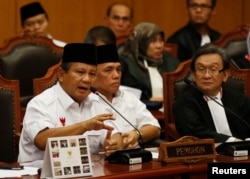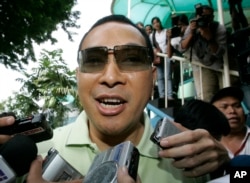The "Paradise Papers,” millions of confidential documents on offshore investments that were leaked this week, have shed light on the financial affairs of world leaders such as Queen Elizabeth II and the president of Colombia. They also cite several prominent politicians in the world’s fourth largest country, Indonesia, including children of its famously corrupt late dictator Suharto, who skimmed over $30 billion in his lifetime.
The documents cite Suharto’s daughter Mamiek and son Tommy, a playboy businessman and convicted murderer; Sandiaga Uno, an entrepreneur and the current deputy of Jakarta; and Prabowo Subianto, a businessman, former army general, and current opposition coalition leader who narrowly lost the 2014 presidential election.
“We found 215 Indonesian names in total,” said Wahyu Dhyatmika, who was the only Indonesian member of the International Consortium of Investigative Journalists (ICIJ) team that shared the documents. He said the remaining names — 200 individuals and 15 companies — would become public as the complete documents are shared in coming weeks. The Indonesian names that have been released so far are only a small, albeit prominent, sample.
The documents are drawn from the offshore law firm Appleby in Bermuda, corporate services providers Estera and Asiaciti Trust, and business registries in 19 tax havens worldwide. They list over 120,000 names of people engaged in offshore investments.
Prominent names
According to the documents, Prabowo was director of a company called Nusantara Energy Resources that opened in Bermuda in 2001 and closed in 2004. Tommy Suharto was director of a company registered in Bermuda called Asia Market Investment, which opened in 1997 and closed in 2000.
Sandiaga, whose name also came up in last year’s Panama Papers leak in relation to shell companies in the British Virgin Islands, was shown to have worked with a Canadian oil and gas exploration company called NTI Resources.
It is difficult to penalize the offshoring of assets as it is rarely illegal. But in Indonesia, the revelations have come during a year of aggressive crackdowns on tax evasion from the Finance Ministry.
Finance Minister Sri Mulyani told reporters this week that she would examine the records of everyone named in the Paradise Papers, although a spokesperson for the ministry said they could not comment on their findings until the remaining 215 Indonesian names have surfaced.
Tommy Suharto showily declared over $910 million last year in the minister’s flagship tax amnesty program to recover overseas assets, more than doubling the revenue at that point.
“As a journalist, I just want people to know how the world works,” said Drew Sullivan, one of the leaders of the ICIJ effort. “Countries like Russia, China. Brazil and Indonesia have too much of their economies, their industries, their wealth and assets moving through opaque structures that hide corruption and wealth. That is not good. You can’t do business in the dark because it’s dangerous and helps corruption thrive.”
“We will try to obtain more comprehensive and detailed data on the individuals named in the Papers as part of efforts to ensure taxpayer compliance,” said Hestu Yoga Saksama, spokesman for the Directorate General of Taxation.
“We’re not shocked by the names that have surfaced,” said Firdaus Ilyas of Indonesia Corruption Watch. “Particularly for the Suhartos — there have historically been very few consequences for that family.” “And Prabowo and Sandi are prominent figures, but they usually campaign on identity politics,” he said, so corruption allegations are unlikely to seriously impact their image or electability.
The challenge of accountability
The offshoring implied by the Paradise Papers is “very typical” of Indonesian business, said Wayne Forrest, who leads the American Indonesian Chamber of Commerce. “The companies registered probably were established in the 1990s… keeping money offshore is standard practice when your currency can devalue,” as it did during the Asian financial crisis and the fall of Suharto.
“Frankly we’re not sure the Directorate General of Taxes is brave enough to investigate the Paradise Papers further; we still haven’t even heard any follow-up to the Panama Papers,” said Firdaus. “[Finance Minister] Sri Mulyani is the best hope for now.”
But there are high costs to investigating the claims: Tommy Suharto once plotted the murder of a judge who served him a corruption charge in 2000; Prabowo organized the kidnappings of pro-democracy activists in 1997 and 1998.
“There is low incentive for Indonesian journalists to follow up on these figures, even though it is the crucial next step” said Andreas Harsono, a former journalist and current researcher with Human Rights Watch in Jakarta. “We need to connect the companies cited in the Papers with the acts they did within Indonesia. Otherwise they are just names.”
Harsono cited the example of George Aditjondro, a journalist who made it his mission to surface the details of Suharto family wealth in the late 1990’s.
“It was a lonely quest, and he died with hardly a penny to his name,” said Harsono. “The fact that he did it is amazing. But working on asset recovery in Indonesia is usually a thankless task.”







